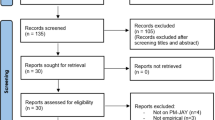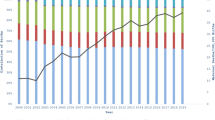Abstract
Objectives From 1994 to the year 2000 the government of Puerto Rico implemented a health care reform which included the mandatory enrollment of the entire Medicaid eligible population under Medicaid managed care (MMC) plans. This study assessed the effect of MMC on the use, initiation, utilization, and adequacy of prenatal care services over the reform period. Methods Using the vital records of all infants born alive in Puerto Rico from the year 1995–2000, a series of bivariate and multivariate analyses were conducted to assess the effect of insurance status (traditional Medicaid, MMC, private insurance and uninsured) on prenatal care utilization patterns. In order to assess the potential influence of selection bias in generating the health insurance assignments, propensity scores (PS) were estimated and entered into the multivariate regressions. Results MMC had a generally positive effect on the frequency and adequacy of prenatal care when compared with the experience of women covered by traditional Medicaid. However, the PS analyses suggested that self-selection may have generated part of the observed beneficial effects. Also, MMC reduced but did not eliminate the gap in the amount and adequacy of prenatal care received by pregnant women covered by Medicaid when compared to their counterparts covered by private insurance. Conclusions The Puerto Rico Health Reform to implement MMC for pregnant women was associated with a general improvement in prenatal care utilization. However, continued progress will be necessary for women covered by Medicaid to reach prenatal care utilization levels experienced by privately insured women.
Similar content being viewed by others
References
Center for Medicare and Medicaid Services. Enrollment Statistics. Retrieved June 10, 2005, from http://www.cms.hhs.gov/medicaid/managedcare/enrolstats.asp.
Conover, C. J., Rankin, P., & Sloan, F. (2001). Effects of Tennessee medicaid managed care on obstetrical care and birth outcomes. Journal of Health Policy, Politics and Law, 26(6), 1291–1324. doi:10.1215/03616878-26-6-1291.
Tai-Seale, M., LoSasso, A. T., Freund, D. A., & Gerber, S. E. (2001). The long-term effects of medicaid managed care on obstetric care in three California counties. Health Services Research, 36(4), 751–771.
Moreno, L. (1999). The influence of tenncare on perinatal outcomes: Perspectives on medicaid managed care. Princeton, NJ: Mathematica Policy Research.
Kaestner, R., Dubay, L., & Kenneym, G. (2005). Managed care, infant health: An evaluation of Medicaid in the US. Social Science and Medicine, 60(8), 1815–1833.
Krieger, J., Connell, F., & LoGerfo, J. (1992). Medicaid prenatal care: A comparison of use and outcomes in fee-for-service and managed care. American Journal of Public Health. 82(2), 185–190.
Levinson, A., & Ullman, F. (1998) Medicaid managed care and infant health. Journal of Health Economics, 17(3), 351–368.
Griffin, J., Hogan, J., Buechner, J., & Leddy, T. (1999). The effect of a medicaid managed care program on the adequacy of prenatal care utilization in Rhode Island. American Journal of Public Health, 89(4), 497–501.
Howell, E. M., Dubay, L., Kenney, G., & Sommers, A. S. (2004). The impact of medicaid managed care on pregnant women in Ohio: A cohort analysis. Health Services Research, 39(4 Pt I), 825–846. doi:10.1111/j.1475-6773.2004.00260.x.
Sommers, A. S., Kenney, G., & Dubay, L. (2005). Implementation of mandatory medicaid managed care in Missouri: Impacts for pregnant women. American Journal of Managed Care, 11(7), 433–442.
Garret, B., Davidoff, A., & Yemane, A. (2001). The effect of medicaid managed care on health services access and utilization: Evidence from the National Health Interview Survey 1991–1995. Washington, DC: The Urban Institute.
Goldfarb, N., Hillman, A., Eisenberg, J., Kelley, M., Cohen, A., & Dellheim, M. (1991). Impact of a mandatory medicaid case management program on prenatal care and birth outcomes. Medical Care, 29(1), 64–71. doi:10.1097/00005650-199101000-00006.
Kenney, G., Sommers, A., & Dubay, L. (2003). Moving to mandatory medicaid managed care in Ohio: Impacts for pregnant women and infants. Washington, DC: Urban Institute.
Sisk, J. E., Gorman, S.A., Reisinger, A.L., Glied, S. A., DuMouchel, W.H., & Hynes, M.M. (1996). Evaluation of medicaid managed care: Satisfaction, access and use. The Journal of Amerrican Medical Association, 276(1), 50–55. doi:10.1001/jama.276.1.50.
Szilalgyi, P. G. (1998). Managed care for children: Effects on access to care and utilization of health services. The Future of Children, Children and Managed Health Care, 8(2), 39–59.
Thompson, J. W., Ryan, K. Y., Pinidiya, S. D., & Bost, J. E. (2003). Quality of care for children in commercial and Medicaid managed care. JAMA: Journal of the American Medical Association, 290(11), 1486–1493. http://ejournals.ebsco.com/direct.asp?ArticleID=46D588D10B7386C57608> .
Zuckerman, S., Brennan, N., & Yemane, A. (2002). Has medicaid managed care affected beneficiary access and use? Inquiry, 39(3), 221–242.
Gazmararian, J. A., Arrington, T. L., Bailey, C. M., Schwarz, K. S., & Koplan, J. P. (1999). Prenatal care for low-income women enrolled in a managed-care organization. Obstetrics and Gynecology, 94, 177–184.
Goldenberg, R. L., & Rouse, D. J. (1998). Prevention of premature birth. The New England Journal Of Medicine, 339, 313–320. doi:10.1056/NEJM199807303390506.
Alexander, G., & Kotelchuck, M. (2001). Assessing the role and effectiveness of prenatal care: History, challenges, and directions for future research. Public Health Repots, 116(4), 306–316.
Bryson, C. L., Ioannou, G. N., Rulyak, S. J., & Critchlow, C. (2003). Association between gestational diabetes and pregnancy-induced hypertension. American Journal of Epidemiology, 158(12), 1148–1153. doi:10.1093/aje/kwg273.
http://www.healthypeople.gov/hpscripts/KeywordResult.asp?n362=362&Submit = Submit (last referenced 10/22/07).
Kotelchuck, M. (1994). An evaluation of the Kessner adequacy of prenatal care index and a proposed adequacy of prenatal care utilization index. American Journal of Public Health, 82(2), 185–190.
Rosenbaum, P. R., & Rubin, D.B. (1983). The central role of the propensity score in observational studies for causal effects. Biometrika, 70, 41–55. doi:10.1093/biomet/70.1.41.
Rubin, D. B. (1997). Estimating causal effects from large data sets using propensity scores. Annals of Internal Medicine, 127(8), 757–763.
Acknowledgements
The Puerto Rico Health Services Research Institute (PRHSI) was established in October 2003, to develop and enhance the capacity to conduct health services research in the Department of Health Services Administration (DHSA) and the Puerto Rico School of Public Health (SPH) at the University of Puerto Rico Medical Sciences Campus. The PRHSI is funded by the Agency for Healthcare Research and Quality (AHRQ) as a Minority Research Infrastructure Support Program (M-RISP). The study was supported by AHRQ Grant #1 R24 HS014060-01. Also, this investigation was in part supported by an RCMI clinical research infrastructure initiative (RCRII), award 1P20 RR11126, from the National Center for Research Resources (NCRR), National Institutes of Health.
Author information
Authors and Affiliations
Corresponding author
Rights and permissions
About this article
Cite this article
Marín, H.A., Ramírez, R., Wise, P.H. et al. The Effect of Medicaid Managed Care on Prenatal Care: The Case of Puerto Rico. Matern Child Health J 13, 187–197 (2009). https://doi.org/10.1007/s10995-008-0345-1
Received:
Accepted:
Published:
Issue Date:
DOI: https://doi.org/10.1007/s10995-008-0345-1




